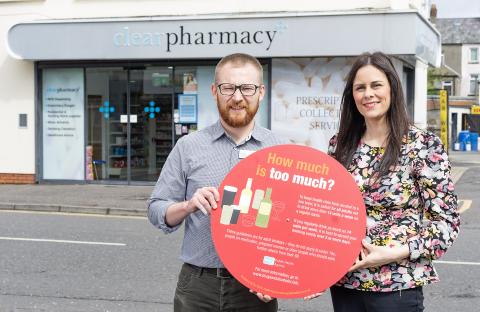Public reminded “alcohol is a powerful drug”: Alcohol Awareness Week

This Northern Ireland Alcohol Awareness Week (16–22 June), those who drink are being reminded that alcohol is a powerful drug and can have a serious impact on their health.
A collaboration between the Public Health Agency (PHA) and Northern Ireland’s five Drug and Alcohol Connection Services, the theme of this year’s Northern Ireland Alcohol Awareness Week is ‘understanding alcohol harm’.
The aim of the week is to ensure that everyone has a better understanding about alcohol harm and the associated health risks. Each of the connection services will be working across local communities to promote the campaign through existing programmes, clubs and running social activities. To find out what is happening in your local area contact your connections service at www.drugsandalcoholni.info/contact-us
Stephanie Hanlon, Joint Regional Lead for Drugs and Alcohol at the PHA, said: “It is easy to forget that alcohol is a powerful drug and, like any drug, it can have a significant impact on our health and wellbeing, and that of our friends and families.
“The risk of developing serious illnesses such as heart attack, stroke and certain cancers increases the more we drink on a regular basis, as well as it having a negative impact on our mental health.
“Aside from the health impacts, we need be aware of the effect of alcohol use on those around us. It can damage relationships and affect our judgement, leading us to do things we wouldn’t otherwise do and that we might regret later. This can include getting into violent situations and unplanned sexual activity.”
The most recent statistics from 2023 show the total number of alcohol-specific deaths registered that year was 341 – 65.5% higher than the number registered a decade ago.
To keep health risks from alcohol to a lower level, it is safest not to drink more than 14 units a week, as recommended by the UK Chief Medical Officers.
Stephanie continued: “If you do drink as much as 14 units per week, it is best to spread this evenly over three or more days – and avoid ‘saving up’ your units for a particular day or a party. 14 units are about the same as five pints of 5% strength beer, so you can see how the units can add up and you can quickly reach your limit.
“If you are concerned about your drinking, or that of someone you know, it is important to remember that support is available. There are services in your local area to help you and also if you’re a friend or family member affected by a loved one’s substance use.”
For more information on local services that offer help and support, visit www.drugsandalcoholni.info or call into your local pharmacy during any time throughout June and July – as part of the Living Well campaign ‘know your units’, community pharmacies across Northern Ireland are offering a free information leaflet, ‘Focus On Alcohol’, and a free unit calculator wheel to highlight the impacts of alcohol use and help you keep track of your units.
A copy of the ‘Focus On Alcohol’ leaflet can be found at www.pha.site/FocusOnAlcohol
In the 2023/24 Northern Ireland Health Survey almost four fifths (78%) of adults reported that they drank alcohol and around four fifths of males (81%) and three quarters of females (76%) were drinkers. Male drinkers (15%) were more likely than female drinkers (9%) to report drinking on three or more days per week. The survey can be found at www.health-ni.gov.uk/news/health-survey-ni-first-results-202324
The most recent statistics from 2023 show the total number of alcohol-specific deaths registered that year was 341. That’s 65.5% higher than the number registered a decade ago so it’s of great importance that everyone takes a look at how drinking may be impacting their lives. This research can be found at www.nisra.gov.uk/publications/alcohol-specific-deaths-northern-ireland-2023
